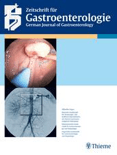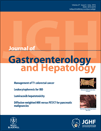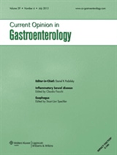
ZEITSCHRIFT FUR GASTROENTEROLOGIE
Scope & Guideline
Pioneering Knowledge in Gastroenterology and Beyond
Introduction
Aims and Scopes
- Gastroenterology Clinical Research:
The journal publishes studies on various gastrointestinal diseases, including inflammatory bowel diseases, liver diseases, and gastrointestinal cancers, with a focus on clinical outcomes and treatment efficacy. - Innovative Treatment Approaches:
Research on novel therapeutic strategies, including biologics, immunotherapy, and personalized medicine in gastroenterology, is a core focus, highlighting advancements that improve patient outcomes. - Guidelines and Best Practices:
The journal frequently includes updates on national and international guidelines for the diagnosis and treatment of gastroenterological conditions, providing practitioners with essential information to enhance clinical practice. - Multidisciplinary Collaboration:
Papers often discuss the importance of multidisciplinary approaches in managing complex gastroenterological conditions, emphasizing cooperation among specialists from various fields. - Real-World Evidence:
The publication emphasizes real-world studies and patient registries, providing insights into treatment effectiveness and patient management in everyday clinical settings.
Trending and Emerging
- Microbiome and Gut Health:
Research exploring the gut microbiome's role in gastrointestinal health and disease has surged, indicating a growing interest in how microbiota influence treatment outcomes and disease progression. - Personalized and Precision Medicine:
There is a notable increase in studies focusing on personalized treatment approaches, particularly in inflammatory bowel disease and hepatocellular carcinoma, aligning with the broader trend in medicine towards tailored therapies. - Telemedicine and Remote Monitoring:
With the rise of digital health solutions, papers discussing the integration of telemedicine in gastroenterology practice are becoming more common, reflecting changes necessitated by the COVID-19 pandemic. - Immunotherapy Advances:
The journal is increasingly publishing studies on immunotherapy, particularly its application in gastrointestinal cancers, highlighting a shift towards exploring immune-based treatments. - Environmental and Sustainability Concerns:
Emerging topics related to the environmental impact of gastroenterological practices, such as 'green endoscopy' initiatives, are gaining attention, reflecting a growing awareness of sustainability in healthcare.
Declining or Waning
- Traditional Gastroenterology Techniques:
There has been a noticeable decrease in articles focused solely on traditional endoscopic techniques and their basic applications, as the field shifts towards more innovative and technology-driven methods. - Pharmacological Treatments without Novelty:
Papers focusing on established pharmacological treatments without new data or alternative approaches have become less frequent, as the journal prioritizes studies that offer new insights or advancements. - General Public Health Topics:
Discussions on general public health issues related to gastroenterology, such as dietary impacts or lifestyle changes, are appearing less frequently as the focus narrows to more specific clinical and therapeutic research. - Case Reports on Rare Conditions:
There is a decline in the number of case reports on rare gastrointestinal conditions, as the journal moves towards more comprehensive studies and clinical trials that provide broader implications for practice. - Basic Science Research:
The journal has shifted its focus away from basic science research in gastroenterology, emphasizing clinical applications and implications over fundamental research findings.
Similar Journals

Gut and Liver
Connecting science and practice in digestive health.Gut and Liver is a prestigious peer-reviewed journal dedicated to advancing the fields of Gastroenterology and Hepatology. Published by the EDITORIAL OFFICE GUT & LIVER in South Korea, this Open Access journal has been disseminating valuable research findings since 2007, making critical knowledge accessible to a global audience. With an impressive 2023 impact factor that places it in Q1 rank in both Gastroenterology (#28/167) and Hepatology (#22/82), it is recognized as a leader in the medical domain. The journal covers diverse topics, including innovative therapeutic strategies, clinical practices, and groundbreaking research in liver diseases and gastrointestinal disorders, thereby playing a vital role in improving patient care and outcomes. Researchers, healthcare professionals, and students can benefit from the journal's wealth of information, designed to foster collaboration and spark new ideas within the scientific community. For further engagement with current research, readers can access issues from 2009 to 2024 and stay updated on the latest advancements in the field.

JOURNAL OF GASTROENTEROLOGY AND HEPATOLOGY
Advancing knowledge in gastrointestinal and liver health.Welcome to the JOURNAL OF GASTROENTEROLOGY AND HEPATOLOGY, an esteemed publication in the field of gastroenterology and hepatology, proudly published by WILEY. Established in 1986, this journal serves as a crucial platform for researchers, healthcare professionals, and students, presenting groundbreaking research and comprehensive reviews that drive advances in understanding and treating gastrointestinal and liver diseases. With a strong reputation evidenced by its Q1 ranking in gastroenterology and Q2 ranking in hepatology, this journal ranks impressively in the Scopus metrics - positioned at #22 out of 167 in gastroenterology and #21 out of 82 in hepatology, reflecting its contribution to scholarly excellence. Although it does not offer open access options, the journal’s rich archive and diverse topics make it indispensable for those dedicated to improving patient outcomes in these critical areas of medicine. Whether you are a seasoned researcher or an aspiring medical professional, engaging with this journal will keep you at the forefront of the latest developments and emerging trends in gastroenterology and hepatology research.

CURRENT OPINION IN GASTROENTEROLOGY
Exploring Innovations in Gastrointestinal ResearchCURRENT OPINION IN GASTROENTEROLOGY is a prestigious peer-reviewed journal published by Lippincott Williams & Wilkins, focusing on the latest advancements and emerging trends within the field of gastroenterology. Established in 1990, the journal has consistently provided a platform for researchers and practitioners to share insights and foster discussions on critical and evolving topics, making it a valuable resource for healthcare professionals and students alike. With its current ranking in the Q2 category of gastroenterology journals and a respectable 67th percentile in Scopus rankings, CURRENT OPINION IN GASTROENTEROLOGY strives to contribute significantly to clinical practices and research methodologies. Although it does not offer open access options, the journal is known for its rigorously curated articles that shape the future of gastroenterology, providing readers with comprehensive reviews and expert opinions. By covering a diverse range of topics, this journal aims to bridge the gap between research and practical application, reinforcing its role as a leader in advancing knowledge within the gastrointestinal field.

Canadian Journal of Gastroenterology and Hepatology
Exploring Innovations in Liver and Gastrointestinal HealthCanadian Journal of Gastroenterology and Hepatology, published by HINDAWI LTD, serves as a vital resource in the fields of gastroenterology and hepatology. Since its inception in 1987, this open-access journal has made significant contributions to advancing research and clinical practice through its comprehensive coverage of topics ranging from liver diseases to gastrointestinal disorders. With an impressive Q2 ranking in Gastroenterology and a Q3 ranking in Hepatology as of 2023, the journal has established itself as an influential platform for researchers and healthcare professionals seeking to disseminate and acquire knowledge. The journal is based in Egypt, with its operational headquarters located in London, England. Notably, it holds a respectable standing in Scopus rankings, placed at Rank #64 in Gastroenterology and Rank #34 in Hepatology, reflecting its impact and relevance in the medical community. With a commitment to quality and accessibility, the Canadian Journal of Gastroenterology and Hepatology continues to foster innovation and collaboration among its readers.

Clinical Gastroenterology and Hepatology
Bridging Science and Practice in Digestive HealthClinical Gastroenterology and Hepatology, published by Elsevier Science Inc, stands as a leading journal in the fields of gastroenterology and hepatology. With an ISSN of 1542-3565 and an E-ISSN of 1542-7714, this esteemed publication has earned its place in the top quartile (Q1) of both gastroenterology and hepatology categories as of 2023, ranking 6th out of 167 and 7th out of 82 respectively. The journal aims to disseminate innovative research, clinical studies, and case reports that advance the understanding and treatment of gastrointestinal and liver diseases. Targeted towards researchers, healthcare professionals, and students, it provides crucial insights into emerging therapies and medical advancements. Clinical Gastroenterology and Hepatology is not only a pivotal resource for contemporary gastroenterological research but also fosters collaboration and knowledge-sharing within the medical community. With a converging publication history from 2003 to the present, the journal continues to build on its solid foundation of scientific excellence and relevance.

Gastroenterology Research
Advancing gastroenterology through innovative research.Gastroenterology Research is a prominent scholarly journal dedicated to advancing the field of gastroenterology. Published by ELMER PRESS INC, this journal serves as a vital platform for disseminating innovative research, clinical findings, and comprehensive reviews that explore the complexities of the gastrointestinal system. With an ISSN of 1918-2805 and an E-ISSN of 1918-2813, it reaches a global audience of researchers, healthcare professionals, and students eager to contribute to or keep abreast of the latest developments in gastroenterology. Though details such as the H-index and Scopus rankings are currently unspecified, the journal's commitment to quality and impact in the medical research community is evident. Gastroenterology Research aims to foster collaboration and knowledge sharing among experts, ultimately improving patient care and outcomes within this critical area of health science. Explore the cutting-edge studies published within its pages and engage with a community passionate about the investigation and treatment of gastrointestinal diseases.

ALIMENTARY PHARMACOLOGY & THERAPEUTICS
Fostering Scientific Dialogue for Digestive Disease SolutionsALIMENTARY PHARMACOLOGY & THERAPEUTICS, published by Wiley, is a premier scholarly journal in the fields of gastroenterology, hepatology, and pharmacology. With an impressive impact factor and ranking in the top quartile (Q1) of its classifications, the journal is recognized for its rigorous peer-reviewed research and comprehensive reviews, aiming to advance the understanding of therapeutic interventions in gastrointestinal and liver diseases. Since its inception in 1987, it has become an essential resource for researchers, healthcare professionals, and students alike, fostering scientific dialogue and innovation. With a Scopus rank placing it in the 97th percentile for pharmacology and 96th for gastroenterology, it is dedicated to publishing the most significant and impactful findings in the field. ALIMENTARY PHARMACOLOGY & THERAPEUTICS thus plays a vital role in shaping the future of medical treatments and interventions in gastrointestinal health.

United European Gastroenterology Journal
Bridging research and practice for clinical excellence.The United European Gastroenterology Journal, published by John Wiley & Sons Ltd, is a leading publication in the fields of gastroenterology and oncology, boasting a distinguished Q1 ranking in both categories for 2023. With an ISSN of 2050-6406 and an E-ISSN of 2050-6414, this journal serves as a vital platform for disseminating cutting-edge research and innovative practices from 2013 to 2024, supporting the advancement of knowledge in gastrointestinal health and cancer treatment. With a commendable Scopus Rank of 14th out of 167 in gastroenterology and 54th out of 404 in oncology, it emphasizes the significance of impactful research in these critical areas. While currently not an open-access journal, it remains a vital resource for researchers, professionals, and students seeking comprehensive insights and evidence-based approaches to improve patient care and clinical outcomes. The United European Gastroenterology Journal is committed to bridging the gap between research and practice, making it an essential reference for those dedicated to the fields of gastroenterology and oncology.

Indian Journal of Gastroenterology
Empowering the Future of GastroenterologyThe Indian Journal of Gastroenterology, a prominent publication in the field of gastroenterology, is published by Springer India. With roots dating back to 1982 and an ongoing commitment to disseminating high-quality research, this journal serves as a vital platform for researchers, practitioners, and students interested in gastrointestinal health and diseases. It boasts an impressive track record with a Scopus rank of #82 in the gastroenterology category and a 2023 quartile ranking of Q3, firmly situating it within the competitive landscape of medical journals. Although it is not an open-access journal, the Indian Journal of Gastroenterology offers accessible research articles contributing significantly to the field, facilitating informed discussion and advancing knowledge in gastrointestinal medicine. The journal's comprehensive focus covers a wide range of topics from clinical studies to innovative therapeutic approaches, ensuring its relevance to current medical practices and the evolving challenges in gastroenterology.

Visceral Medicine
Transforming Insights into Practice in Visceral MedicineVisceral Medicine is a distinguished journal published by KARGER, specializing in the fields of gastroenterology and surgery. With an ISSN of 2297-4725 and an E-ISSN of 2297-475X, this journal has secured its place in the academic landscape since its inception in 2016, maintaining a consistent quality of research and fostering advancements in visceral health through the year 2024. With notable rankings within the 2nd quartile (Q2) for both gastroenterology and surgery categories, Visceral Medicine ranks #101 out of 551 in the Medicine & Surgery category and #67 out of 167 in Gastroenterology according to Scopus, reflecting its significant impact and relevance in the pursuit of scientific knowledge. Despite not being an open access journal, it provides valuable insights and original research aimed at professionals, researchers, and students keen on expanding their understanding of visceral diseases and innovative surgical techniques. The journal is headquartered in Basel, Switzerland, contributing to its reputation as a hub for high-quality scholarly communication within the medical community.